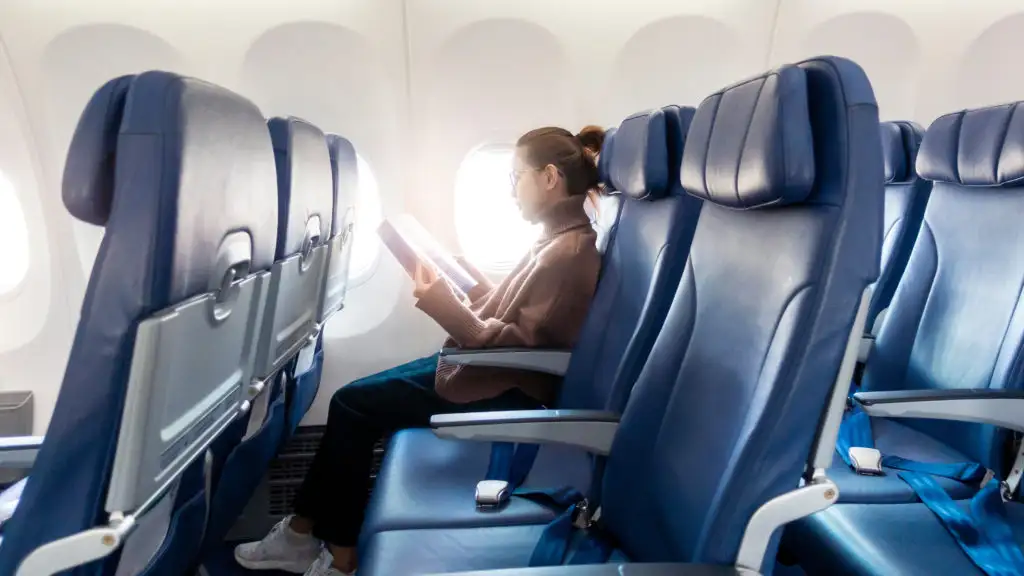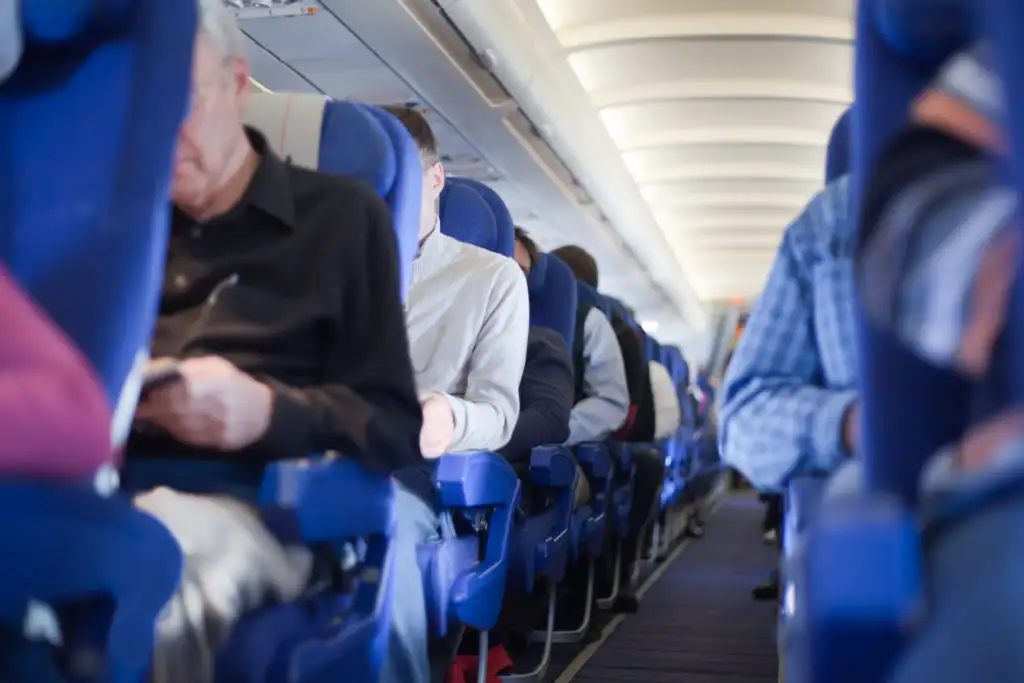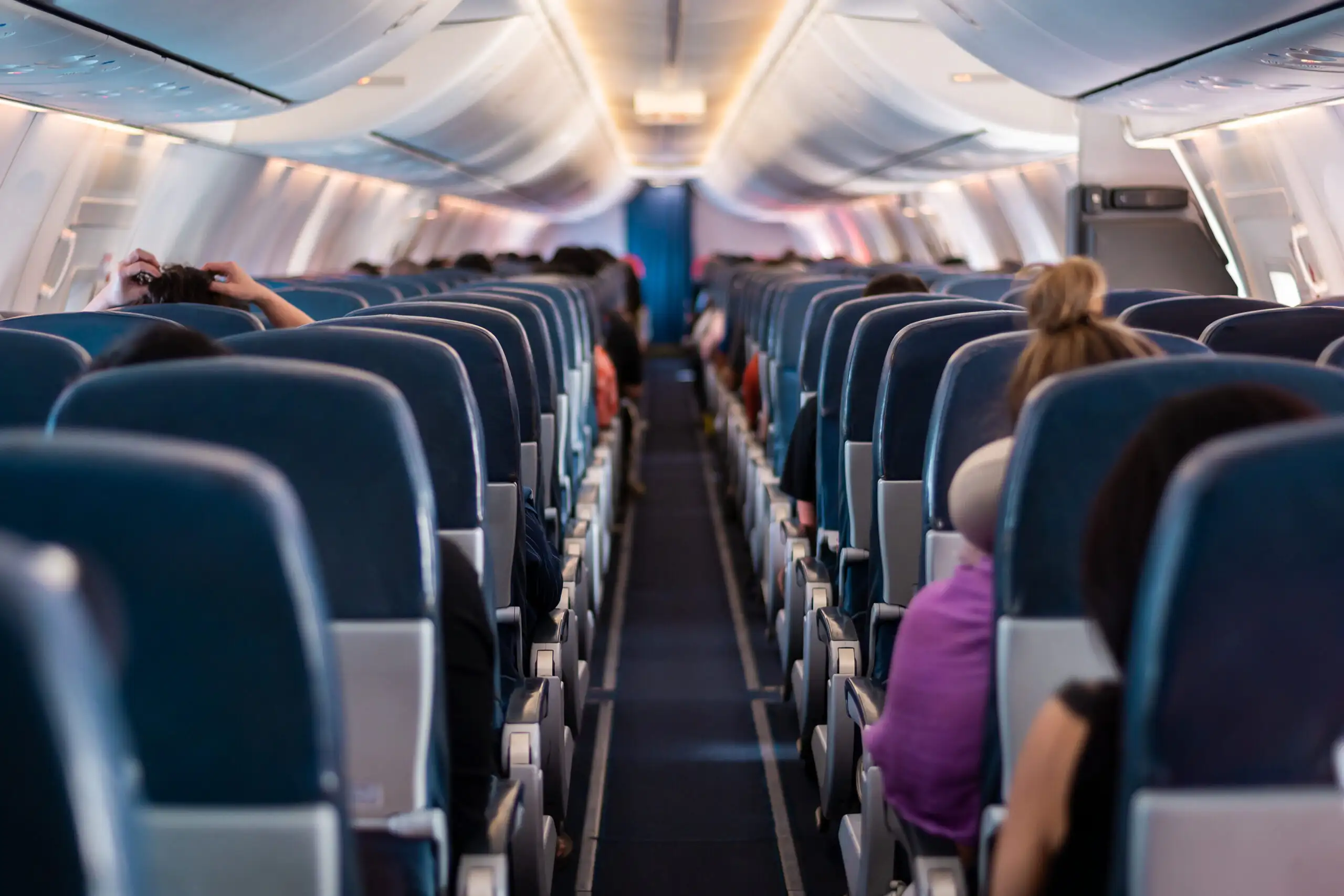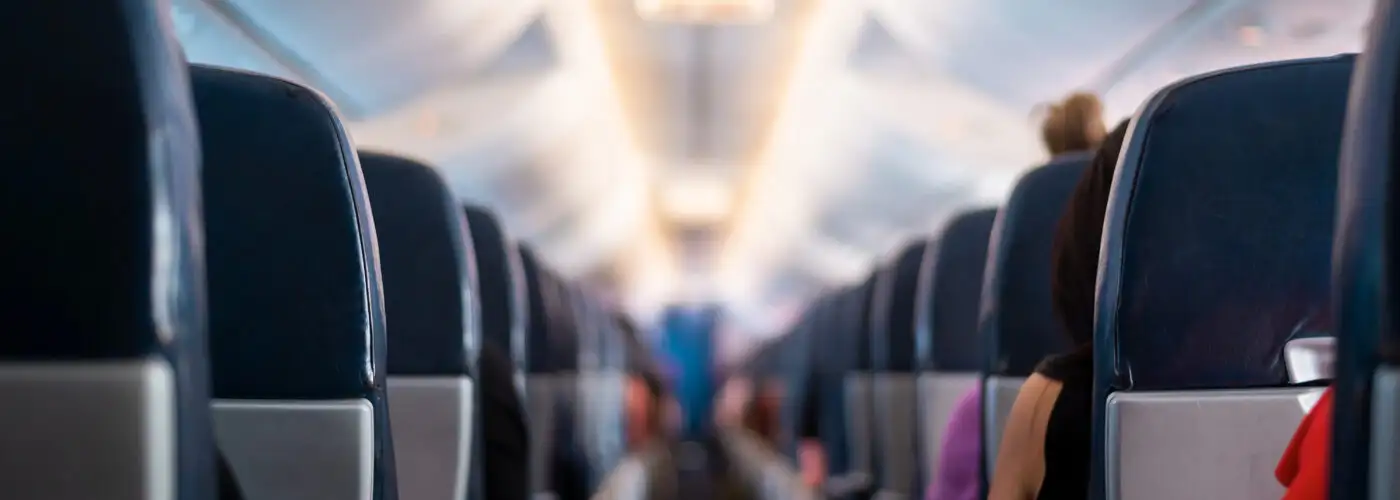We’ve all been there—the small child kicking the back of your seat, the lack of legroom, the war over the armrest. While there’s no fail-safe way to guarantee an aisle seat in the exit row near the front of the plane with no one sitting next to you, there are some tactics that can help. Check out the following tips for nabbing one of the best seats on a plane.
The Best Place to Sit on a Plane

Not all coach seats are created equal. Exit rows, aisle or window seats, and seats close to the front are typically considered the best seats on a plane.
On a short business trip, you might want an aisle seat near the front of the plane so you can debark as quickly as possible on arrival. On a long-haul or overnight flight, you might prefer to have a coach seat next to the window so you can rest your head. The drawback is that you’ll need to disturb your seatmates each time you need to go to the bathroom. Nervous flyers may want to sit toward the middle of the plane over the wing, where there is less turbulence.
Exit row seats usually offer a bit more legroom, but they’re not appropriate if you’re traveling as a family. Children under 12 or 15 years old, depending on the airline, are not permitted to sit in exit rows, and by U.S. law infants are not allowed in the rows immediately behind or in front of an exit row either. Larger planes often have two exit rows, but it’s wise to avoid the first one, as the seats often will not recline. It is also important to note that if an emergency does occur, you will be expected to help out.
Many flyers also like “bulkhead seats,” which are the seats directly behind the physical barriers (such as walls, curtains, or screens) that separate different parts of the plane. Because there are no seats in front of you, you won’t get stuck with another passenger reclining into your lap—and you often get some extra legroom as well.
But be careful: Not all “bulkhead” rows are created equal. On some planes the first bulkhead row may be cramped and uncomfortable, or close to restrooms and noisy galleys. Also, keep in mind that you won’t have a spot to stow a personal item under the seat in front of you for easy access. Some planes offer bassinets for babies at the bulkhead wall, so you could be forced to spend the flight in close proximity to a crying child.
Each airline presents a unique set of challenges to flyers, say the experts at SeatGuru: “Not all legroom is equal since there is no industry standard. Before booking your flight, take a look to see which airlines fly that route and then check to see how they stack up against each other.” For more information, go to SeatGuru.com, where you can check out seat maps for nearly every type of plane on every major airline.
Keep an eye on seat pitch, especially if you’re tall. This is a measure of how much space there is between a seat and the one immediately behind or in front of it—so the higher the number, the more legroom you will have. SeatGuru lists both seat pitch and width (when available) for most airlines, and indicates the location of power ports or personal TV screens at each seat. Keep in mind, though, that the aircraft type could change at the last minute, so you can’t be absolutely sure about the configuration until you step onto the plane.
If you’re looking to sit in the safest part of the plane, opt for a seat near the rear.
The middle seat in any row is generally undesirable. (Don’t miss SmarterTravel’s tips for surviving the middle seat if you get stuck there.) Rows near flight attendant areas and restrooms tend to be noisier and have more traffic, and seats very close to overhead movie screens can be uncomfortable or too bright if you are trying to sleep. SeatGuru also identifies other potential problems on its seat maps, such as limited recline or reduced seat width.
10 Ways to Get a Better Seat

So how can you avoid the pitfalls above and land one of the best seats on a plane? Follow these tips.
Join a frequent flyer program.
This is the most reliable tactic you can use. Providing your frequent flyer number at the time of reservation goes a long way toward netting you a good seat, especially if you are a loyal, high-ranking member. Elite flyers tend to be first in line for upgrades.
To achieve status, you’ll have to fly at least 25,000 actual air miles in a calendar year on one particular airline or its partners. Hang onto your boarding passes until you check your online account to ensure your miles have been credited. Once you’ve racked up some frequent flyer miles, you may use them for seat upgrades. Boost your earning power by signing up for an airline-affiliated credit card with signing bonuses of 40,000 miles or more.
Buy your tickets early.
The number of seats available for pre-assignment dwindles as the travel date approaches. SeatGuru says that usually you can’t choose good seats the day before your flight since most of the best airplane seats go quickly. The earlier you book your flight, the more seats are available and the bigger your pool is to pick from. Try for a flight on a Tuesday or Wednesday when it’s less busy, leaving more middle seats open so you have more wiggle room beside you while sitting on the aisle or by the window.
If you can’t buy your tickets at least several weeks in advance, be sure to check in online as soon as possible before your flight to select a seat, or arrive at the airport early if online check-in isn’t available. When you’re seat shopping, don’t assume business class costs much more than coach. Sometimes you can get a nonrefundable deal for a seat in first or business class for just a bit more.
Purchase a better seat.

Many airlines now offer economy-class seats with extra legroom for an additional fee. For example, JetBlue’s Even More Space seats, many of which are in exit rows, have up to seven extra inches of seat pitch. United offers Economy Plus access to high-ranking frequent flyers and to any travelers who pay the annual fee. This entitles you to a few extra inches of seat pitch toward the front of the coach cabin. (If any Economy Plus seats are still available at flight time, they can be purchased on a one-time basis.) Other airlines offer similar programs.
Make sure you understand what you’re getting for the money. You may be closer to the front of the cabin, but that might be all you’re buying since no perks (like meals) come with your “upgraded” coach seat.
Select your seat when you book.
Most airline websites and booking engines allow you to choose a seat when you purchase your ticket, or to return to your reservation after your initial purchase and select a seat later. In many cases, this process is free, but some airlines have added fees for advance seats. If you don’t see a seat you like, return to your reservation as your trip date approaches to see if anything has opened up in the meantime. If you don’t like your online options, try again at the airport, either at check-in or at the gate.
If you try to select your seat once you’ve booked your flight, you might see only the more expensive premium economy seats are available. That doesn’t mean you won’t get a seat eventually. In fact, you may get the premium economy seat anyway when you check in online—without having to pay extra.
Confirm your seat at check-in.
Most airlines allow passengers to check in online up to 24 hours before their flight departs. At that point you can confirm the seat you’ve already chosen or select a better one. Watch for last-minute offers for discounted upgrades on premium economy and business-class seats. Failing that, many airlines hold back the exit rows and bulkheads—the most coveted seats in economy class—until the day of flight so they can be assigned at the airport. You still have a good shot of getting into those more popular rows.
Consider calling the airline directly if online seat assignment is not available. You can also confirm your seat the week you’re flying in case better seats have opened up. Check again a few hours before flight time to see if a good seat has become available.
Short on time or don’t want to keep looking? You can set up a seat alert through ExpertFlyer.com. A single alert is free, but subsequent alerts are charged at $0.99 each.
Get to the airport early.
If you check in too late or arrive too late at your gate, the airline might give away your seat. Follow the airline’s guidelines about how far in advance you should arrive for domestic and international flights.
When in doubt, ask.
Long gone are the days when asking sweetly could get you a first-class upgrade on a flight, but it’s worth a try if you’re not satisfied with your current seat assignment. Once you reach your gate, ask whether any new seats have opened up. If other passengers upgrade to business class or don’t show up for the flight, you might get lucky and grab a better seat assignment.
Be specific.

If you know exactly which seat you’re interested in, it can be easier for agents to get it for you. Instead of asking for “a good seat,” try asking for “an aisle seat near the front” or “an exit row seat.” You’ll be more likely to get what you want (or an acceptable substitute). Ask again before you board. Sometimes gate agents are able to reassign seats at the last minute.
If you still don’t get a desirable seat, wait until the plane doors close. You may be able to move to an unoccupied seat. Check the last rows in the plane since they are often the last seats assigned. However, make sure to check with a flight attendant before hopping into an empty seat.
Keep the agent informed.
If you have a disability or medical condition, or you need to sit next to your small children, let the agent know. Most will do their best to accommodate you.
Kindness counts.
Approach airline agents with courtesy. They hear complaints and demands all day. Speak to them kindly, and you may be surprised. Says SeatGuru, “Keeping the phrase ‘treat others the same way you want to be treated’ in mind and following that can unlock a lot of doors for you.”
Book Your Stay With SmarterTravel Hotels
No matter where you’re flying, find your hotel for a great rate with SmarterTravel Hotels.
Editor’s note: This story was originally published in 2017. It has been updated to reflect the most current information. Christine Sarkis, Jessica Labrencis, and Michele Sponagle contributed to this story. Some of the links featured in this story are affiliate links, and SmarterTravel may collect a commission (at no cost to you) if you shop through them.
You Might Also Like:
• The Best Frequent Flier Programs for 2025• The Most Expensive Airports in the U.S. To Fly From
• How to Stay Sane When Planning a Trip with Friends
• 4 Common Travel Disasters and How to Prevent Them
• 10 Ways to Speed Through Airport Security
We hand-pick everything we recommend and select items through testing and reviews. Some products are sent to us free of charge with no incentive to offer a favorable review. We offer our unbiased opinions and do not accept compensation to review products. All items are in stock and prices are accurate at the time of publication. If you buy something through our links, we may earn a commission.
Related
Top Fares From Wichita, KS
Today's Top Travel Deals
Brought to you by ShermansTravel
Shop and Save with Country Inns...
Patricia Magaña
 Hotel & Lodging Deals
Hotel & Lodging Deals
$229 -- Chicago: Discounted Rates and...
Francesca Miele
 Hotel & Lodging Deals
$229+
Hotel & Lodging Deals
$229+
$188 -- Honolulu: Save on Oceanview...
Abigail Lamay
 Hotel & Lodging Deals
$188+
Hotel & Lodging Deals
$188+





